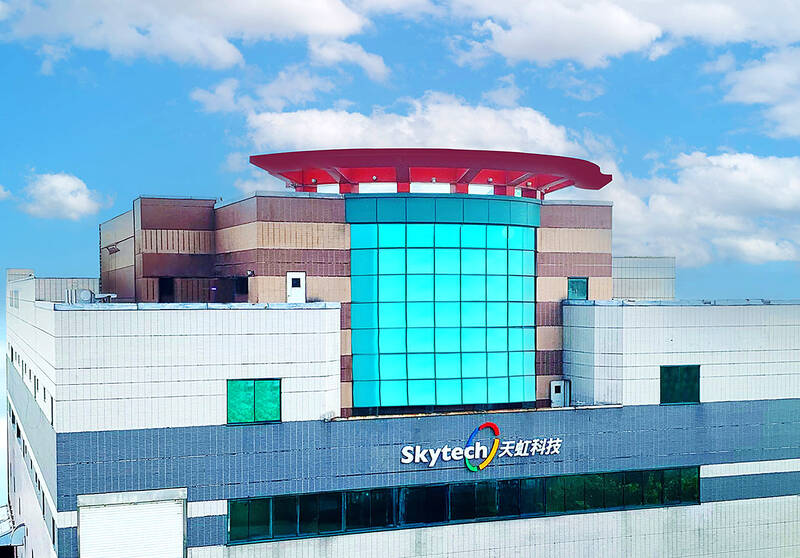Staff Reporter, in HSINCHU COUNTY
Semiconductor equipment manufacturer Skytech Inc (天虹科技) yesterday gave a rosy business outlook for next year on expectations that revenue would grow at least 20 percent year-on-year, thanks to robust demand for advanced chip manufacturing and its new advanced packaging equipment.
The forecast is based on its clear order visibility through the middle of next year, the company said. To satisfy customers’ growing demand, Skytech is expanding its clean room in Hsinchu County’s Hukou Township (湖口). The new clean room would be one-and-half times larger than the original one, when it is ready by the end of this year, it said.

Photo: Screenshot from Skytech Inc’s Web site
“We are upbeat about the 2025 outlook. We expect to see a similar growth pattern as this year, with a growth rate of more than 20 percent,” Skytech CEO George Yi (易錦良) said yesterday. “We have landed new orders from major chipmakers to supply equipment used in advanced packaging technology that is similar to the chip-on-wafer-on-substrate technology.”
Skytech is shipping physical vapor deposition tools, bonders and de-bonders used in advanced packaging technology, Yi said.
Some products are under customer review in preparation for future shipments, he said.
The company also secured new orders to supply atomic layer deposition equipment, which is used in the front-end chip manufacturing process, Yi said.
During the first 10 months of this year, Skytech’s revenue grew 18.33 percent to NT$1.69 billion (US$51.9 million) from NT$1.43 billion a year earlier. With more revenue coming in later this quarter, the company said revenue would climb to an all-time high this quarter.
Skytech is among a few Taiwanese companies that design and produce key equipment used in the chip manufacturing process. It has a broad customer base that includes Taiwan Semiconductor Manufacturing Co (台積電).
Semiconductor equipment made up about 50 percent of Skytech’s total revenue, including advanced front-end chip manufacturing equipment and packaging equipment, which accounted for about 20 percent of the firm’s total revenue.
Another half of revenue came from supplying components and parts to chipmakers, chip testing and packaging service providers, and other vendors, the firm said.
During the first three quarters, Skytech’s net profit soared 64.15 percent year-over-year to NT$261 million, from NT$159 million during the same period last year. That translated into earnings per share of NT$3.87, up from NT$2.62 in the same period a year earlier.
As Skytech has a 30-percent exposure to the Chinese market, it is closely monitoring how the geopolitical tension changes. Currently, local semiconductor equipment makers are not subject to any export ban yet.

Semiconductor business between Taiwan and the US is a “win-win” model for both sides given the high level of complementarity, the government said yesterday responding to tariff threats from US President Donald Trump. Home to the world’s largest contract chipmaker, Taiwan Semiconductor Manufacturing Co (TSMC, 台積電), Taiwan is a key link in the global technology supply chain for companies such as Apple Inc and Nvidia Corp. Trump said on Monday he plans to impose tariffs on imported chips, pharmaceuticals and steel in an effort to get the producers to make them in the US. “Taiwan and the US semiconductor and other technology industries

SMALL AND EFFICIENT: The Chinese AI app’s initial success has spurred worries in the US that its tech giants’ massive AI spending needs re-evaluation, a market strategist said Chinese artificial intelligence (AI) start-up DeepSeek’s (深度求索) eponymous AI assistant rocketed to the top of Apple Inc’s iPhone download charts, stirring doubts in Silicon Valley about the strength of the US’ technological dominance. The app’s underlying AI model is widely seen as competitive with OpenAI and Meta Platforms Inc’s latest. Its claim that it cost much less to train and develop triggered share moves across Asia’s supply chain. Chinese tech firms linked to DeepSeek, such as Iflytek Co (科大訊飛), surged yesterday, while chipmaking tool makers like Advantest Corp slumped on the potential threat to demand for Nvidia Corp’s AI accelerators. US stock

The US Federal Reserve is expected to announce a pause in rate cuts on Wednesday, as policymakers look to continue tackling inflation under close and vocal scrutiny from US President Donald Trump. The Fed cut its key lending rate by a full percentage point in the final four months of last year and indicated it would move more cautiously going forward amid an uptick in inflation away from its long-term target of 2 percent. “I think they will do nothing, and I think they should do nothing,” Federal Reserve Bank of St Louis former president Jim Bullard said. “I think the

SUBSIDIES: The nominee for commerce secretary indicated the Trump administration wants to put its stamp on the plan, but not unravel it entirely US President Donald Trump’s pick to lead the agency in charge of a US$52 billion semiconductor subsidy program declined to give it unqualified support, raising questions about the disbursement of funds to companies like Intel Corp and Taiwan Semiconductor Manufacturing Co (台積電). “I can’t say that I can honor something I haven’t read,” Howard Lutnick, Trump’s nominee for commerce secretary, said of the binding CHIPS and Science Act awards in a confirmation hearing on Wednesday. “To the extent monies have been disbursed, I would commit to rigorously enforcing documents that have been signed by those companies to make sure we get